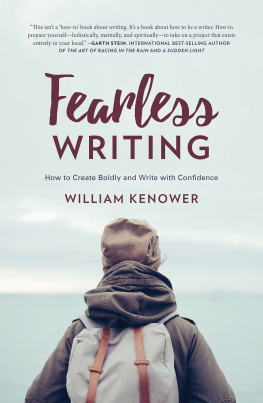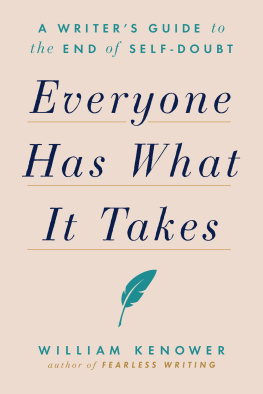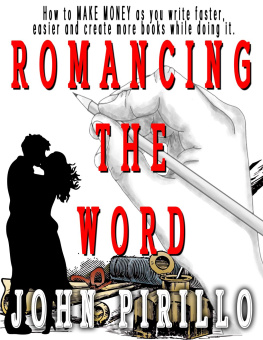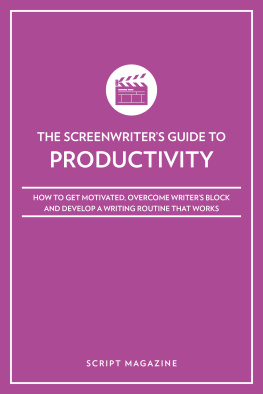Contents
Guide
Fearless
WRITING
How to Create Boldly and Write with Confidence
WILLIAM KENOWER

WritersDigest.com
Cincinnati, Ohio
DEDICATION
For Jen
Because love is the beginning, middle, and end.
TABLE OF CONTENTS
2 THE FLOW
Or Where the Writing Actually Happens
3 FEEL FIRST
Or Why Nobody Cares What Happens
4 WRITE WHAT YOU LOVE
Or How Your True Interest Will Never Steer You Wrong
5 ACCURACY
Or Theres No Such Thing as Good Writing
6 CRITIQUES AND WORKSHOPPING
Or Why Praise Feels Good and Criticism Feels Bad
7 THE INTENTIONAL ARC
Or Why We Tell Stories
8 CREATIVE DISCOMFORT
Or How to Love What You Thought You Hated
9 WRITING IS LISTENING
Or Were All Smart Enough
10 FINDING TIME TO WRITE
Or Why Procrastination Makes Sense
11 HOW THOUGHT WORKS
Or Tell Yourself a Happy Story
12 FEARLESS MARKETING
Or How to Do Your Job and No One Elses
13 DONT FEAR THE CLICH
Or RelaxYoure Original
14 THE TALENT MYTH
Or Everyone Is Interested in Something
15 FEAR OF FAILURE
Or You Never Stop Learning
16 EVIDENCE
Or Dont Fear the Wobble
17 BECOMING THE AUTHOR OF YOUR LIFE
Or How to Live Like You Write
INTRODUCTION
The suspense writer G.M. Ford is an outliner. Like all outliners, he believes in the outline. He would not know how to write a book without one. The outline is his structure, his road map through the uncharted jungle of a new story. During our conversation, he broke down his outlining process, how many plot points he required, how much of his characters backgrounds he needed to know before he started to write. As a former high school English teacher, he was instructive, and mildly suspicious of non-outliners.
You have to lay it out, he told me in his soft Brooklyn accent. If you lay it out, if you know where youre going, it saves you lots of time. But heres the thing, he continued, leaning forward. You dont want to outline too much. You gotta leave room for the magic.
He broke into a smile at the word magic, as he did at no other time in our conversation. Every writer I have ever spoken tofrom students to aspiring authors at writers conferences to Pulitzer Prizewinning literary writersknows about the magic. In fact, the promise of this magic is what brings every writer back to the desk, day in and day out, through good sessions and bad. If the magic went away, so would the writers.
I like to talk to other writers about the magic, and they like to talk to me about itthat is, once they know Im a writer, too. Writers are wary of talking to nonwriters about the magic because they fear they will sound unintentionally mystical or, even worse, a little crazy. The magic, you see, is always surprising. In normal life, other people or events surprise us. When we write, we are surprised without anyone elses help. It is not accurate to say I surprise myself, because this would suggest I am somehow in control of the surprise. I can no more make these surprises occur than I can tickle myself. Instead I invite them, and if I am in the correct frame of mind, they arrive.
This is why writers dont like to answer the question, Where do your ideas come from? They dont know. Worse yet, if they thought about it too much they might begin to doubt the whole mysterious process, and doubt is exactly the wrong frame of mind for receiving the delicious surprises writers look forward to every day. Of course, writers rarely need excuses to doubt. The long, dim journey of writing a book invites the question Is this thing any good at all? Theres no sure way to answer. None. And yet here you are, plodding away for a year or two or three, or God knows how many, writing and rewriting, sometimes with a contract, often without, but certainly with no guarantees. All you have for sure is the everyday foraging and waiting and wondering.
It can keep you up at night, and so some writers become devotees of craft. Perhaps a semblance of certainty can be found in the time-honored tenets of story structure and character development, or in clear language, snappy openings, showing and not telling, or concrete nouns and strong verbs. Perhaps if we follow enough rulesrules hammered out by the Masters who came before uswe can skillfully navigate these uncertain waters.
Craft is great. Ive certainly got my list of rules I follow. But this is not a book about craft. This is a book about confidence. Once you learn craft, you cant lose it unless you stop writing, and even then, like your times tables, it will come back with a little practice. But you can lose your confidence as quick as a thought, and once it is lost, no amount of craft will be of use to you. Writing cant begin until you find your confidence.
Fortunately, unlike craft, you dont have to learn your confidence. Youve always had it, and it never leaves, and its always in the exact same place. In this way, it is like balance. I studied aikido for many years. This defensive martial art is based on the premise that all attacks are inherently unbalanced. The aikido student practices keeping her balance under increasingly challenging conditions. In aikido, your balance is your strength.
My aikido teacher once told me a story about Morihei Ueshiba, aikidos founder, and it has remained one of the best writing lessons I have ever received. One day, one of Ueshibas oldest students was watching the master demonstrate technique after technique. Throughout the demonstration, Ueshibas balance appeared perfect. The student had been observing this since the first day he trained, striving unsuccessfully ever since to emulate the masters apparent perfection. At the end of class he approached the great teacher.
Sensei, he began, I have to ask you a question: I have been training and training for years. Every day I train, I am off balance. Every technique, no matter how rudimentary, I am always off balance. I watch you train, and you are never off balance. How do you do it?
No, no, said Ueshiba. This isnt true. I am frequently off balance. I am just very quick to get back on balance.
This is the best description I have ever heard of mastery. I cannot write without my confidence, and I must find it with every sentenceindeed with every wordI write, in the same way I find my balance every time I walk. It is a practice because my confidence is not a point on a grid, and because every days work session is different than the one before. Sometimes the way is smooth and level, and sometimes it is narrow and rocky. No matter; my confidence always remains available to me, regardless of the terrain.
When you are in your confidence, you are fearless. If youve ever had the experience of entering the dream of a story and forgetting about the world around you, forgetting about your problems and the news and the weather, then you have written fearlessly. It is impossible to write and be afraid. The two states are incompatible. So you already know how to do what you must do. But perhaps you dont know how to write fearlessly on purpose. Perhaps you think theres some luck involved, that on some days the Muse visits and on others she doesnt.
Luck has nothing to do with writing fearlessly any more than it has to do with your ability to stand on your own two feet. Your confidence is not capricious or vindictive. It is as steady and predictable as the sun. But you must choose to rest in it and write from it. And, unlike teaching you aikido for the first time, I cannot demonstrate how to find your confidence. I cannot adjust your feet or shoulders to show you exactly how to hold your body during this technique or that technique. Your fearless, inherent confidence is known only to you. It is as personal and internal as the stories you are about to write.










